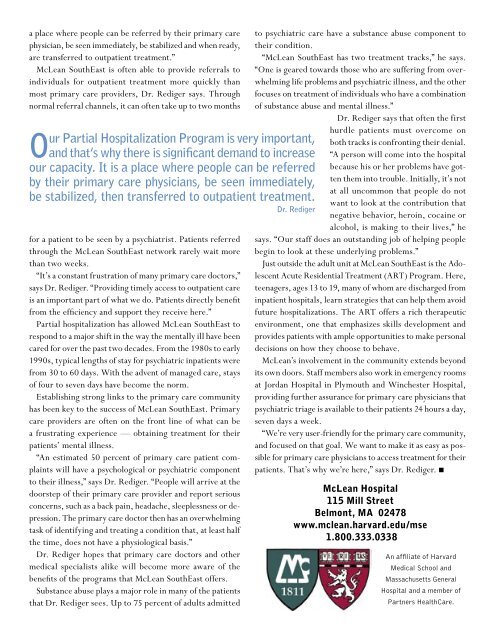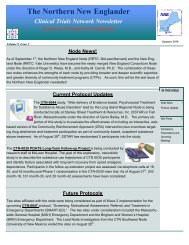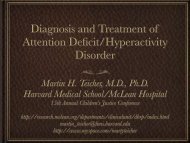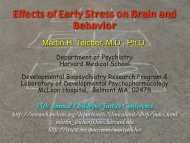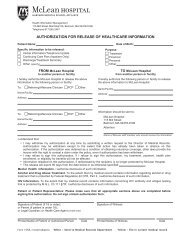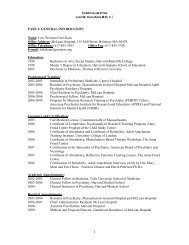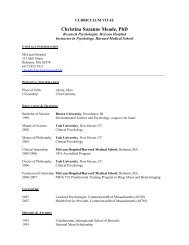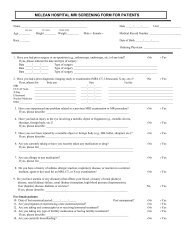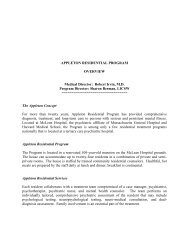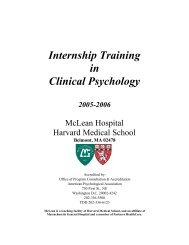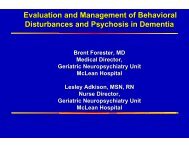Jeffrey Rediger, MD Jeffrey Rediger, MD - McLean Hospital
Jeffrey Rediger, MD Jeffrey Rediger, MD - McLean Hospital
Jeffrey Rediger, MD Jeffrey Rediger, MD - McLean Hospital
Create successful ePaper yourself
Turn your PDF publications into a flip-book with our unique Google optimized e-Paper software.
a place where people can be referred by their primary carephysician, be seen immediately, be stabilized and when ready,are transferred to outpatient treatment.”<strong>McLean</strong> SouthEast is often able to provide referrals toindividuals for outpatient treatment more quickly thanmost primary care providers, Dr. <strong>Rediger</strong> says. Throughnormal referral channels, it can often take up to two monthsOur Partial <strong>Hospital</strong>ization Program is very important,and that’s why there is significant demand to increaseour capacity. It is a place where people can be referredby their primary care physicians, be seen immediately,be stabilized, then transferred to outpatient treatment.Dr. <strong>Rediger</strong>for a patient to be seen by a psychiatrist. Patients referredthrough the <strong>McLean</strong> SouthEast network rarely wait morethan two weeks.“It’s a constant frustration of many primary care doctors,”says Dr. <strong>Rediger</strong>. “Providing timely access to outpatient careis an important part of what we do. Patients directly benefitfrom the efficiency and support they receive here.”Partial hospitalization has allowed <strong>McLean</strong> SouthEast torespond to a major shift in the way the mentally ill have beencared for over the past two decades. From the 1980s to early1990s, typical lengths of stay for psychiatric inpatients werefrom 30 to 60 days. With the advent of managed care, staysof four to seven days have become the norm.Establishing strong links to the primary care communityhas been key to the success of <strong>McLean</strong> SouthEast. Primarycare providers are often on the front line of what can bea frustrating experience — obtaining treatment for theirpatients’ mental illness.“An estimated 50 percent of primary care patient complaintswill have a psychological or psychiatric componentto their illness,” says Dr. <strong>Rediger</strong>. “People will arrive at thedoorstep of their primary care provider and report seriousconcerns, such as a back pain, headache, sleeplessness or depression.The primary care doctor then has an overwhelmingtask of identifying and treating a condition that, at least halfthe time, does not have a physiological basis.”Dr. <strong>Rediger</strong> hopes that primary care doctors and othermedical specialists alike will become more aware of thebenefits of the programs that <strong>McLean</strong> SouthEast offers.Substance abuse plays a major role in many of the patientsthat Dr. <strong>Rediger</strong> sees. Up to 75 percent of adults admittedto psychiatric care have a substance abuse component totheir condition.“<strong>McLean</strong> SouthEast has two treatment tracks,” he says.“One is geared towards those who are suffering from overwhelminglife problems and psychiatric illness, and the otherfocuses on treatment of individuals who have a combinationof substance abuse and mental illness.”Dr. <strong>Rediger</strong> says that often the firsthurdle patients must overcome onboth tracks is confronting their denial.“A person will come into the hospitalbecause his or her problems have gottenthem into trouble. Initially, it’s notat all uncommon that people do notwant to look at the contribution thatnegative behavior, heroin, cocaine oralcohol, is making to their lives,” hesays. “Our staff does an outstanding job of helping peoplebegin to look at these underlying problems.”Just outside the adult unit at <strong>McLean</strong> SouthEast is the AdolescentAcute Residential Treatment (ART) Program. Here,teenagers, ages 13 to 19, many of whom are discharged frominpatient hospitals, learn strategies that can help them avoidfuture hospitalizations. The ART offers a rich therapeuticenvironment, one that emphasizes skills development andprovides patients with ample opportunities to make personaldecisions on how they choose to behave.<strong>McLean</strong>’s involvement in the community extends beyondits own doors. Staff members also work in emergency roomsat Jordan <strong>Hospital</strong> in Plymouth and Winchester <strong>Hospital</strong>,providing further assurance for primary care physicians thatpsychiatric triage is available to their patients 24 hours a day,seven days a week.“We’re very user-friendly for the primary care community,and focused on that goal. We want to make it as easy as possiblefor primary care physicians to access treatment for theirpatients. That’s why we’re here,” says Dr. <strong>Rediger</strong>. ■<strong>McLean</strong> <strong>Hospital</strong>115 Mill StreetBelmont, MA 02478www.mclean.harvard.edu/mse1.800.333.0338An affiliate of HarvardMedical School andMassachusetts General<strong>Hospital</strong> and a member ofPartners HealthCare.


